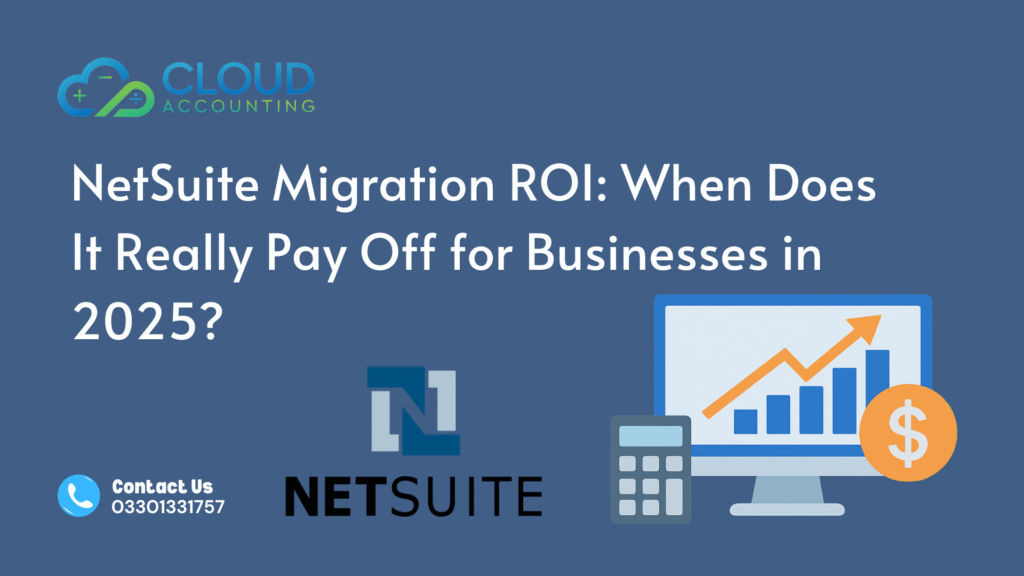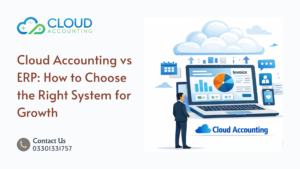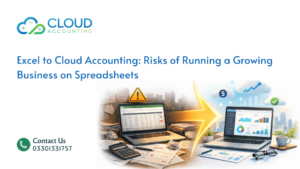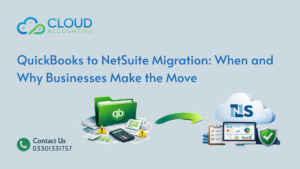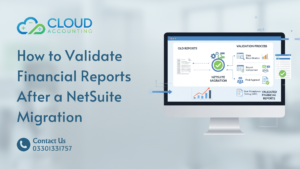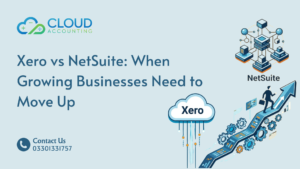Every business leader considering a move to NetSuite asks the same question when will it pay off?
That’s where NetSuite Migration ROI becomes the real deciding factor. Beyond the buzz of cloud ERP and automation, what matters most is whether the investment delivers measurable financial and operational returns.
In 2025, more companies are migrating to NetSuite to escape outdated, disconnected systems. But not every migration automatically leads to profit. The ROI of your NetSuite migration depends on factors like implementation cost, process efficiency, and how well your team adopts the new system.
At Cloud Accounting, we’ve seen both sides — migrations that transformed profitability, and others that stalled due to poor planning. This article unpacks how to evaluate your NetSuite Migration ROI, what costs to consider, and when you can expect your investment to truly start paying off.
Understanding NetSuite Migration ROI
Before calculating returns, it’s important to understand what NetSuite Migration ROI actually represents. ROI, or return on investment, is a simple yet powerful metric—it compares the total value gained from your NetSuite system to the total cost of implementation, migration, and ongoing use.
For businesses shifting from legacy software or spreadsheets, this ROI often reflects more than just cost savings. It shows how much faster your team can close the books, how much cleaner your financial data becomes, and how efficiently you can make decisions with real-time visibility.
When evaluating the ROI of ERP migration, companies typically measure three categories of benefits:
- Financial returns — reduced software costs, lower maintenance, and faster financial reporting cycles.
- Operational gains — fewer manual processes, better data flow across departments, and stronger compliance.
- Strategic impact — improved forecasting, scalability, and readiness for growth.
The true NetSuite benefits for businesses extend beyond efficiency. It’s about transforming the way financial data powers every decision. That’s why understanding ROI isn’t just a finance exercise—it’s a business strategy essential for growth in 2025.
The Real Costs Behind a NetSuite Migration
When businesses calculate their NetSuite Migration ROI, many only focus on software licenses or subscription fees. But the real picture is much broader. To understand when your migration pays off, you need a clear view of both direct and indirect costs.
1. NetSuite Implementation Cost
The NetSuite implementation cost typically includes software setup, data migration, integrations, and configuration. Depending on your business size and complexity, it can range from a few thousand to several tens of thousands of dollars. Custom workflows, user training, and third-party add-ons also add to the investment.
2. Data Migration and Cleanup
Migrating from legacy systems often reveals messy or duplicate data. Cleansing and mapping this data properly takes time and expertise, but it directly affects the accuracy of your new system. Poor migration quality can delay ROI by months.
3. Training and Change Management
Even the most advanced ERP platform fails without user adoption. Investing in training ensures your team fully understands NetSuite’s capabilities and uses it effectively. The smoother your staff transition, the faster you’ll see a positive return.
4. Ongoing Subscription and Support
While one-time setup costs are predictable, your monthly subscription fees and ongoing support should also be included in the total cost calculation. These are essential for maintaining system performance and ensuring your ROI continues to grow.
The total investment may feel high upfront, but when implemented correctly, NetSuite quickly repays that cost through efficiency, accuracy, and better visibility. Recognizing every hidden expense helps you make more realistic ROI projections and avoid unpleasant surprises later.
The Benefits Driving ROI for Businesses
Every company investing in an ERP system hopes for measurable returns — and that’s where NetSuite Migration ROI shines. When implemented correctly, NetSuite delivers both financial and operational payback that grows over time.
1. Financial Efficiency and Cost Reduction
NetSuite eliminates the need for multiple disconnected tools, cutting costs tied to maintenance, manual reporting, and data reconciliation. Over time, this consolidation alone can significantly improve the ROI of ERP migration by reducing total software spend and IT overhead.
2. Productivity and Time Savings
Businesses often underestimate how much time is lost managing spreadsheets and manual processes. With NetSuite, tasks that once took hours—like closing monthly accounts or running reports—can be completed in minutes. That productivity gain translates directly into higher ROI.
3. Better Data Accuracy and Decision-Making
When your financial data lives in one unified platform, errors drop dramatically. Teams can access accurate, real-time insights for smarter decision-making. For many companies, that improved accuracy is the turning point for achieving a positive NetSuite Migration ROI.
4. Scalability and Growth Potential
NetSuite scales as your business expands. Whether you’re opening new locations or managing multiple subsidiaries, the platform grows with you—without needing another expensive system overhaul. That scalability contributes to stronger long-term cloud ERP investment returns.
5. Real-World Impact
One of our clients, a mid-sized distributor, struggled with month-end reporting delays and inconsistent data between systems. After migrating to NetSuite, their closing process dropped from ten days to three—and their ROI target was achieved within the first year.
In short, the NetSuite benefits for businesses extend well beyond accounting. They create operational agility, accuracy, and visibility that pay off year after year.
Timeline: When Does NetSuite Migration Start Paying Off?
Every business wants to know the same thing — how long before our NetSuite Migration ROI becomes visible?
The honest answer: it depends on your goals, the complexity of your setup, and how efficiently your team adapts.
Short-Term (0–6 Months): Setup and Adjustment
In the early phase, most of your costs are upfront — including licensing, configuration, and training. You’ll start to see small wins like cleaner reporting and reduced manual entry, but your ROI will still be in its infancy.
This period is about laying a solid foundation for long-term cloud ERP investment returns.
Mid-Term (6–12 Months): Efficiency Gains Begin
As your team gets comfortable, efficiency gains become noticeable. Processes like invoicing, reconciliation, and reporting speed up. Data accuracy improves, and the first tangible financial savings appear.
For many companies, this is when the NetSuite migration timeline starts to turn positive.
Long-Term (12–24 Months): Full ROI Realized
After one to two years, most businesses reach their true NetSuite Migration ROI potential. The system’s automation, integrations, and analytics capabilities deliver compounding returns.
At this stage, you’re not just saving time — you’re driving growth through faster decision-making, improved forecasting, and better control over resources.
Beyond Two Years: Continuous Optimization
ROI doesn’t stop at year two. With ongoing optimization and periodic system reviews, your ERP continues to create value. Businesses that refine workflows or expand NetSuite modules often double their return within a few years.
The bottom line? Your NetSuite implementation cost begins to pay off within the first year, but sustained ROI requires proper support, training, and post-migration review.
How to Calculate Your NetSuite Migration ROI
Knowing your NetSuite Migration ROI isn’t just about feeling confident—it’s about seeing clear numbers that prove your investment makes sense. Fortunately, calculating ROI is straightforward once you have the right data.
The Basic ROI Formula
The standard formula looks like this:
ROI = (Net Gain from Investment – Total Cost of Investment) ÷ Total Cost of Investment × 100
In the case of your NetSuite project:
- Net Gain from Investment = the measurable benefits (time saved, reduced errors, faster reporting, etc.)
- Total Cost of Investment = your NetSuite implementation cost, data migration, training, and ongoing fees
For example:
If your business saves $80,000 in efficiency and reporting improvements within the first year, and your total investment was $50,000—your ROI would be:
(($80,000 – $50,000) ÷ $50,000) × 100 = 60% ROI
That means you’ve recovered your costs and gained 60% extra value within 12 months.
Factors That Affect ROI
While the formula is simple, the outcome depends on several factors:
- Data Quality: Clean, accurate data ensures smoother migration and better insights post-go-live.
- User Adoption: Trained users drive efficiency faster, maximizing the ROI of ERP migration.
- Process Alignment: Mapping existing workflows correctly to NetSuite prevents delays and rework.
- Support & Optimization: Post-launch support helps maintain performance and accelerate returns.
Beyond Numbers: The Strategic ROI
Sometimes, the NetSuite benefits for businesses extend beyond what spreadsheets can measure. Real-time dashboards, improved audit readiness, and better cross-department visibility all add strategic value that strengthens long-term cloud ERP investment returns.
By regularly tracking both financial and operational metrics, you’ll know exactly when your migration begins to pay for itself — and how to keep improving those numbers year after year.
Maximizing Your NetSuite Migration ROI with Expert Guidance
Even the best ERP system can fail to deliver results if it’s not implemented correctly. That’s why the difference between a mediocre migration and a high-performing one often comes down to expertise. Partnering with certified professionals can dramatically increase your NetSuite Migration ROI and shorten your payback period.
1. Expert Planning and Data Assessment
A strong ROI starts long before go-live. Our migration specialists assess your existing systems, data accuracy, and process gaps before any transfer begins. By identifying potential bottlenecks early, we help you avoid costly rework and delays that impact overall NetSuite implementation cost.
2. Customized Migration Strategy
Every business is different. We tailor your migration plan based on your size, structure, and reporting needs. Whether you’re moving from QuickBooks, Xero, or another ERP, our customized approach ensures you only pay for what adds real value to your ROI calculation.
3. Smooth Data Conversion and Validation
Data accuracy drives financial trust. Our team verifies every record after migration, ensuring your books, invoices, and reports align perfectly within NetSuite. Clean data means cleaner reports—and faster ROI of ERP migration once operations resume.
4. Post-Migration Support and Optimization
ROI doesn’t end at go-live. Continuous improvement and training keep your system efficient as your business grows. We help you fine-tune NetSuite dashboards, automate workflows, and track performance metrics so your cloud ERP investment returns keep improving.
At Cloud Accounting, our goal is simple: to help you turn NetSuite from a cost into a growth engine. With years of ERP migration experience and dedicated post-migration support, we make sure your business sees measurable ROI faster than you thought possible.
Ready to see your NetSuite investment pay off?
Talk to our migration experts today to build a data-driven plan that maximizes your ROI.
Conclusion: When Your NetSuite Migration Truly Pays Off
Measuring your NetSuite Migration ROI isn’t about chasing numbers—it’s about understanding how the right strategy turns a software investment into long-term business value. The truth is, ROI doesn’t come from technology alone. It comes from how well your migration is planned, executed, and supported over time.
When you factor in accurate data migration, team training, and expert post-launch guidance, the ROI of ERP migration becomes both predictable and sustainable. Most businesses start seeing returns within 12 to 24 months, but those who optimize their setup continue gaining value year after year.
At Cloud Accounting, we specialize in making that happen. Our experienced migration team helps you minimize your NetSuite implementation cost, achieve faster results, and ensure your system delivers real-world impact. From financial accuracy to operational efficiency, we help you unlock the full potential of your cloud ERP investment returns.
Get your ROI-ready NetSuite migration plan today. Talk to our certified experts and discover how soon your investment can start paying off.

